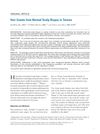Intractable Diffuse Alopecia Caused by Multifactorial Side-Effects in Treatment of Acute Lymphocytic Leukemia: Connection to Iatrogenic Failure of Estrogen Secretion
December 2011
in “
Pediatric Dermatology
”

TLDR The patient's long-term hair loss was caused by leukemia treatments and low estrogen levels, worsened by her genetic tendency for hair loss.
The paper presented a case study of a 22-year-old female who suffered from intractable diffuse alopecia after being treated for acute lymphocytic leukemia at age 8 with chemotherapy, whole-brain radiotherapy, and bone marrow transplantation. She had a genetic predisposition to pattern hair loss and experienced progressive hair loss over her body after the treatment. At age 20, she underwent estrogen substitution therapy for 14 months, which temporarily improved her hair volume, but the alopecia returned after the therapy ended. Histopathologic examinations revealed a 60% reduction in hair follicles and the presence of vellus hair. The study concluded that the patient's hair loss was influenced by estrogen in the context of her genetic predisposition, and that the treatment for leukemia, particularly radiation and chemotherapy, contributed to her persistent alopecia. The progression of hair loss 8 years post-treatment was linked to dermal fibrosis from chronic irradiation disorder and low estrogen levels. This case highlights that iatrogenic diffuse alopecia can be a long-term effect in childhood cancer survivors.




